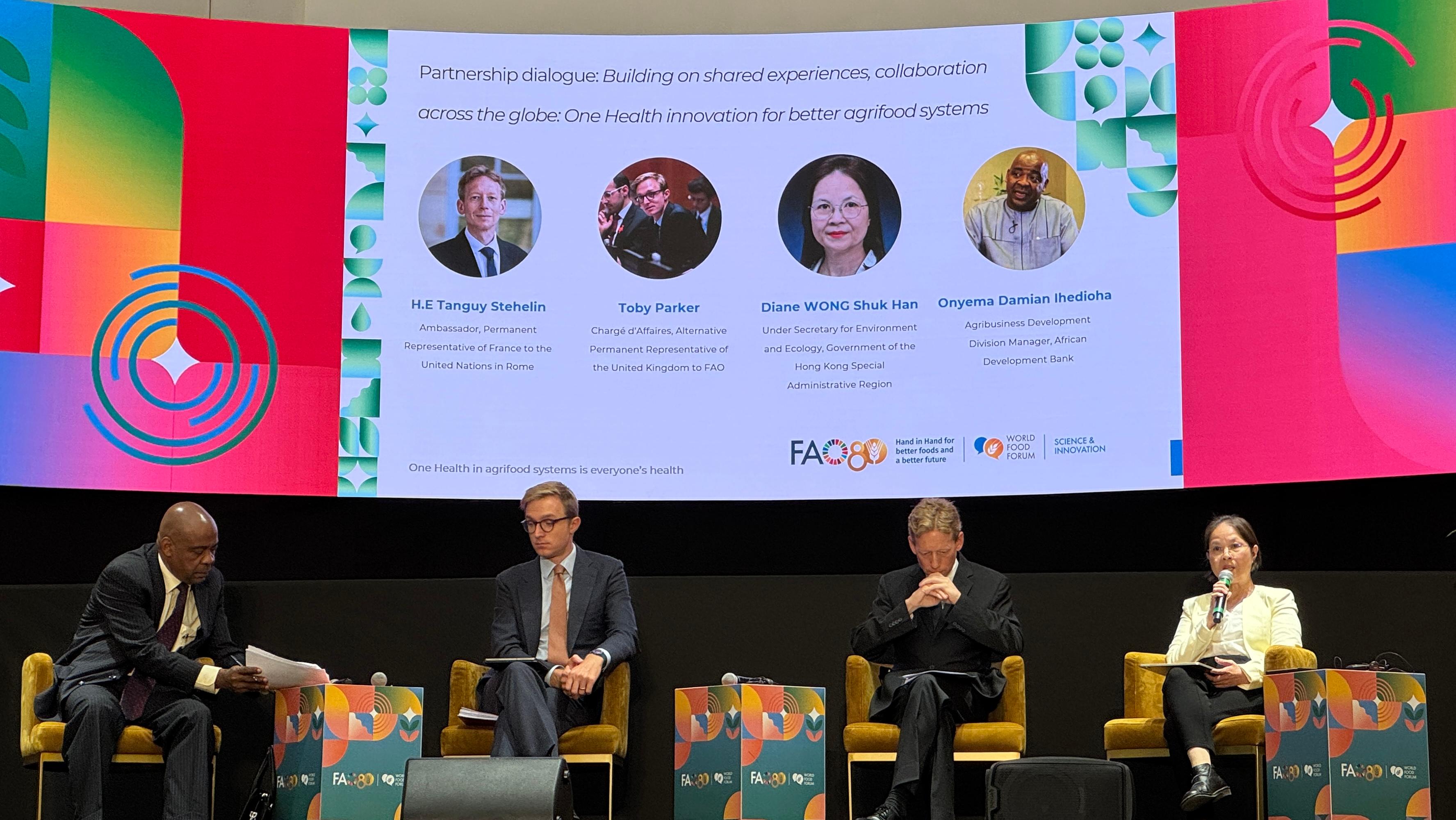Speech by USEE at partnership dialogue of Science and Innovation Forum of World Food Forum 2025 in Rome, Italy (English only) (with photo)
******************************************************************************************
On the FAO (Food and Agriculture Organization)'s 80th anniversary, it is my honour to participate in the Partnership Dialogue today. This morning, we witnessed the signing of a Letter of Intent between the FAO and the HKSAR (Hong Kong Special Administrative Region) Government to show mutual commitment to implement the One Health approach. This is indeed the best moment to take stock of the latest developments in the HKSAR.
In the international arena, the FAO, the World Organisation for Animal Health, the World Health Organization, and the United Nations Environment Programme collaborate to drive the transformation required for mitigating the impact of health challenges at the human-animal-plant-environment interface at the global, regional and country level.
On the HKSAR's part, while our agricultural land is limited, we have embraced various innovative solutions in support of the One Health approach, including in the agrifood systems.
Back in September 2017, the HKSAR Government organised an International Conference on One Health in the HKSAR as one of the celebration activities for the 20th anniversary of the establishment of the HKSAR.
In December 2023, the HKSAR Government announced the Blueprint for the Sustainable Development of Agriculture and Fisheries, which outlines the Government's vision and work targets to promote the upgrading and transformation of the local agricultural and fisheries industries. I will give two examples under the Blueprint, namely urban farming and a multi-storey pig farm.
We seek to develop urban farming through a multipronged approach, with a view to integrating commercial agriculture into urbanised areas of the city to produce high-quality and fresh agricultural produce with reduced carbon footprints, and also providing green landscapes and modernised farming experiences to the communities.
We have pioneered the adoption of high-efficiency hydroponic systems, which boost yield while simultaneously conserving water. These soil-free cultivation systems not only eliminate the need for chemical pesticides but also reduce the risk of plant disease transmission.
We have recently launched the first pilot urban farm that utilises advanced farming technology in a public park, and will set up modernised hydroponic farms-cum-stalls on suitable rooftops of public markets. These help promote the concept of "harvest-to-sale", shortening the supply chains from farms to consumers.
We are also pioneering the development of multi-storey, modernised, and environmental-friendly livestock farming that exemplifies the integration of advanced technology with the One Health principles.
This innovative vertical farming model harnesses cutting-edge automated systems and smart technologies to enhance biosecurity measures and significantly reduces environmental impact through enclosed, controlled environments. It not only curtails disease risks and reduces reliance on antibiotics but also maximises farming efficiency through precise resource management.
Our multi-storey pig farm project is scheduled to commence operation around 2032.
We now come to the prevention of zoonotic diseases. On diseases like avian influenza:
- we have a robust, science-driven surveillance and control programme, actively monitoring the viruses across the entire spectrum - from chicken farms and wholesale markets to pet bird shops, recreational parks and nature reserves;
- we have enforced a compulsory vaccination programme on local farms for over two decades; and
- with advancements in laboratory technology over the years, analysing local surveillance data and integrating findings from global health networks enable the updating of our designated vaccines in a timely manner to ensure vaccination efficacy.
The absence of highly pathogenic avian influenza outbreaks on any local farm since 2008 demonstrates the effectiveness of the approach.
On antimicrobial resistance, we have been implementing a comprehensive Strategy and Action Plan through close collaboration on human health, animal health and environment fronts. Citing the work of the animal health sector for illustration purposes, the actions include:
- systematic surveillance of antimicrobial usage and resistance in livestock;
- the formulation of science‑based guidelines and farm-specific disease management plans to encourage prudent use of antimicrobials; and
- practical support to farmers in strengthening hygiene, vaccination and biosecurity.
These concerted efforts reflect our commitment to innovation, prevention and integration under the One Health principles. We seek to safeguard human health and animal health and advance a healthier, more resilient, and more sustainable future for all. We will continue to deepen our interdisciplinary collaboration, guided by the One Health principles. In this way, we hope to transform challenges into opportunities and deliver tangible and lasting impact. Thank you.
Ends/Friday, October 17, 2025
Issued at HKT 19:00
Issued at HKT 19:00
NNNN



